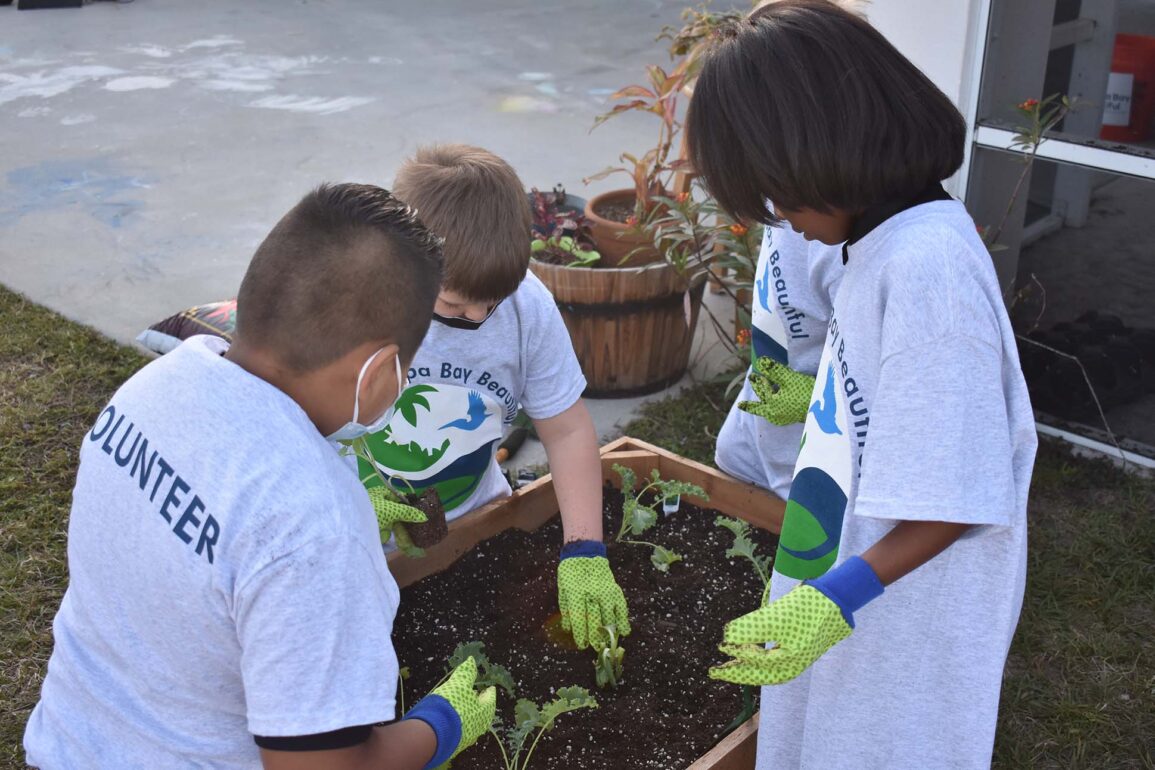By Salomé Gómez-Upegui
Tampa Bay is beautiful, and Debbie Evenson keeps it that way. As executive director of Keep Tampa Bay Beautiful (KTBB), she is partly responsible for waterways that are free of garbage and debris, and for organizing the team of people who work to protect the natural environment, keeping the city’s surroundings as beautiful (and healthy) as possible.
Founded in 1989, the nonprofit works tirelessly to raise awareness about how we relate to these waterways, and how we function together as part of the ecosystem. As an independent affiliate of the nationwide environmental organization Keep America Beautiful, their mission is to “promote a culture of environmental stewardship through volunteer and educational opportunities.” Day-to-day activities include ambitious plans for tree-planting projects, large-scale restoration initiatives, and executing hundreds of successful volunteer cleanups in Tampa Bay every year.
For the record, the group has managed to organize more than 1900 cleanup and beautification projects, have properly disposed of more than 35,000 pounds of waste, has improved close to 2,500 miles of roadway, and 6,000 acres of public land while planting over 2,000 gardens, plants, and trees.

“I feel that, as a team, we’ve made a huge difference in our community,” Evenson says, beaming. “Volunteers are the heart of the organization. Without them? We can’t do what we do.”
Equally important a component to their services, education is key to the nonprofit’s efforts. Evenson, who has worked with KTBB for over 20 years, is convinced it’s this approach that makes most of their work so impactful.
“It’s not just about completing certain activities with volunteers,” she says. “We want to educate them so they understand why we do these activities as well.”
Given her extensive tenure at KTBB, Evenson has had the fortune of seeing the organization grow over the years. “At one point, we were working with a couple hundred volunteers on a very low budget. And now, I’m proud to say we’re a very well-known, grassroots organization and volunteers love working with us. We make it easy for them, and we make it so that they want to come back,” she says.
Today, KTBB works with about 16 to 20 thousand volunteers a year, including thousands of young locals seeking a fun alternative to complete mandatory service hours, groups of workers looking for engaging team-building opportunities, and families intent on giving back to the community.

Evenson goes on to say that working with the organization doesn’t cost volunteers “a dime beyond their time.” When organizing cleanups, KTBB provides all required materials for a successful outing, including gloves and trash bags, as well as the necessary training to guarantee a seamless experience.
When volunteers come out for some good fun in the sun, volunteers can focus on land-based efforts or aquatic ones, removing trash from waterways. The org has a 26-foot catamaran, one they built themselves, stationed at Marjorie Park Marina. It goes out a few times a week with volunteers on board who donate their time to retrieve all sorts of floating objects and trash from Tampa’s major rivers and channels.
Evenson is adamant about highlighting the disproportionate amount of trash that ends up in the water. She says the issue is especially concerning in Florida, “since a lot of people don’t realize that there are no grates on our storm drains, so we have to find a way to properly dispose of the trash before it gets to our waterways.”
Thankfully, water-based cleanups with the catamaran allow volunteers to get close to mangroves to scoop up trash from these critical environments. What’s more is the opportunity for education; it becomes a teaching-and-learning moment for the org and its volunteers as they see the trajectory of how land-based trash reaches the water, accumulating in the coastal shrubs.

“When volunteers go out, they get to see the Hillsborough River up close and understand where the trash is coming from. When it rains, trash floats down this river, and where does it end up? Tampa Bay,” says Evenson. “And then where does that end up? Our oceans.”
Shockingly, over the last few years, KTBB volunteers have pulled up around 200 electric bikes from the Hillsborough River. “And there are still more down there,” Evenson says.
Despite how daunting their mission seems at times, two decades into this work, Evenson believes things can change for the better. “It will change for the next generation. We need to get the right message out there, and we need everyone to get on the same page, but I’m hopeful,” she says.
Though KTBB has cultivated a lasting relationship with many volunteers, their biggest challenge now is still spreading the word. Not just in terms of finding new volunteers who are excited to work with them but reaching an audience that can understand the urgency of what they’re doing.
And though it seems simple, Evenson says that following them on social media (@keeptbb on Instagram) and helping KTBB spread the word about their mission is a simple act that can truly help advance their cause.

On that note, beyond volunteering with KTBB, Evenson believes there are numerous effective habits everyone can be aware of to avoid accruing trash in places where it shouldn’t be, ultimately making a big difference for the environment from any region.
One starting place, Evenson says, could be considering ways to reduce unnecessary trash. “Sometimes it’s as simple as having a reusable cup,” she says.
Recycling is another key strategy that everyone can be a little more informed on. Evenson mentions a useful rule of thumb: “If you don’t know whether something is recyclable or not, put it in the trash. It’s best to err on the wrong side because once you contaminate a recycling bin, the whole thing goes to waste.”
Speaking of small but impactful acts, “cigarette butts are the number one littered item in the world,” Evenson adds. “Many people think that since they’re small, it’s probably not a big deal to throw them on the ground but disposing of them properly can make a very big difference.”
Bottle caps are another small example of trash that has a big impact. And plastic bags, she notes—these float into waterways and can be eaten by turtles (who think they are jellyfish).
“People sometimes ask what’s the point of picking up other people’s trash?” Evenson says. “And the answer is pretty simple: this is our home, it’s our community, we all have to take responsibility and keep it as beautiful as we can.”


